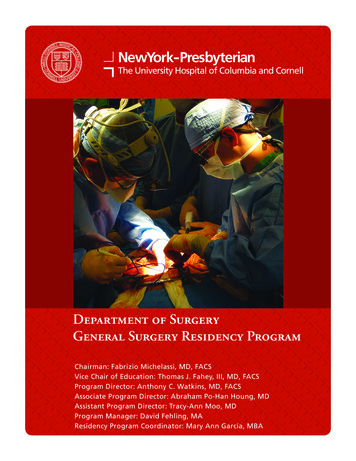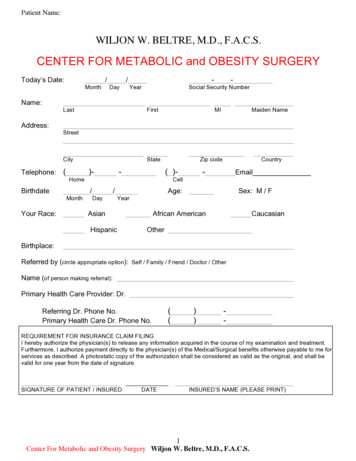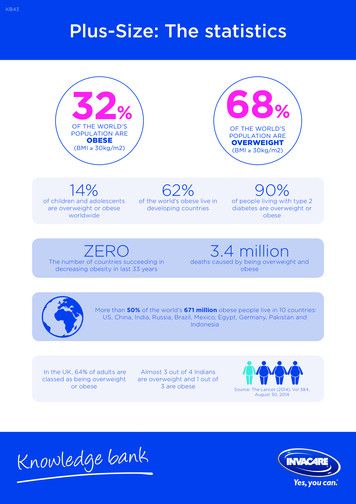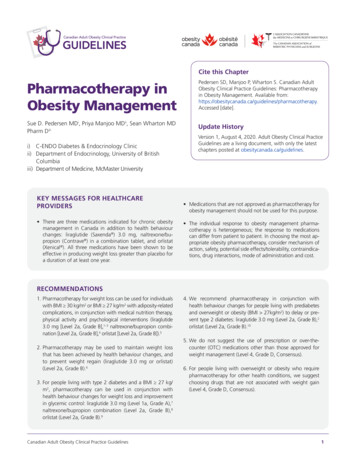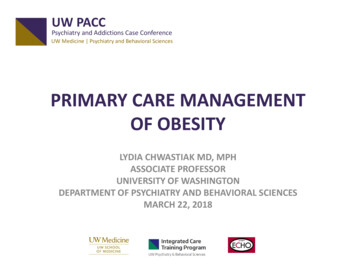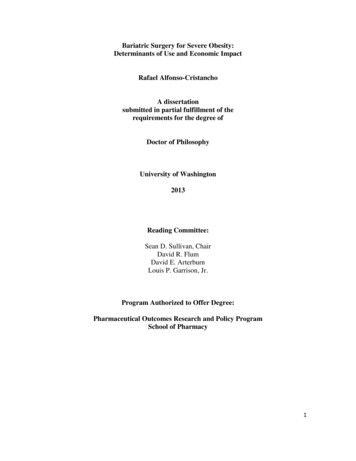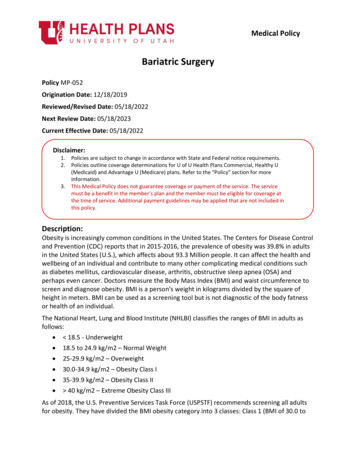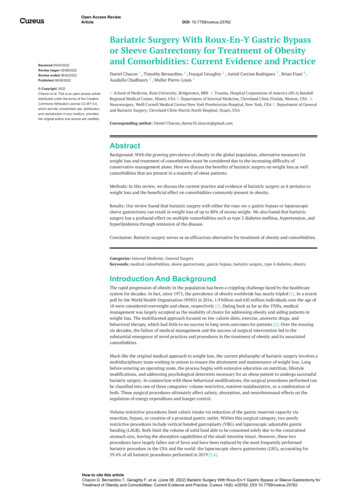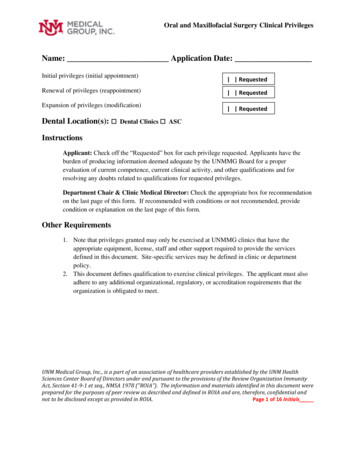
Transcription
Page 1 of 42Obesity SurgeryClinical Policy Bulletin: Obesity SurgeryRevised April 2014Number: 0157PolicyNote: Most Aetna HMO and QPOS plans exclude coverage of surgical operations, procedures ortreatment of obesity unless approved by Aetna. Some Aetna plans entirely exclude coverage ofsurgical treatment of obesity. Please check benefit plan descriptions for details.I. Roux-en-Y Gastric Bypass (RYGB), Laparoscopic Adjustable Silicone Gastric Banding(LASGB), Sleeve Gastrectomy, Biliopancreatic Diversion (BPD) and Duodenal Switch (DS)Procedures:Aetna considers open or laparoscopic Roux-en-Y gastric bypass (RYGB), open orlaparoscopic sleeve gastrectomy, open or laparoscopic biliopancreatic diversion (BPD) withor without duodenal switch (DS), or laparoscopic adjustable silicone gastric banding(LASGB) medically necessary when the selection criteria listed below are met.Selection criteria:A. Must meet either 1 (adults) or 2 (adolescents):1. For adults aged 18 years or older, presence of persistent severe obesity,documented in contemporaneous clinical records, defined as any of thefollowing:a. Body mass index (BMI) (see appendix) exceeding 40; orb. BMI greater than 35 in conjunction with any of the following severe comorbidities:i. Clinically significant obstructive sleep apnea (i.e., person meetsthe criteria for treatment of obstructive sleep apnea set forthin CPB 0004 - Obstructive Sleep Apnea in Adults); or Coronaryii. heart disease, with objective documentation (by exercise stresstest, radionuclide stress test, pharmacologic stress test, stressechocardiography, CT angiography, coronary a/100 199/0157 draft.html10/22/2014
Obesity SurgeryPage 2 of 42heart failure or priormyocardialinfarction); orhttp://qawww.aetna.com/cpb/medical/data/100 199/0157 draft.html10/22/2014
Page 3 of 42Obesity Surgeryiii. Medically refractory hypertension (blood pressure greater than140 mmHg systolic and/or 90 mmHg diastolic despite concurrentuse of 3 anti-hypertensive agents of different classes); oriv. Type 2 diabetes mellitus2. For adolescents who have completed bone growth (generally age of 13 in girlsand age of 15 in boys), presence of obesity with severe co-morbidities:a. BMI exceeding 40 with one or more of the following serious comorbidities:i. Clinically significant obstructive sleep apnea; orii. Type 2 diabetes mellitus; oriii. Pseudotumor comorbiditiesb. BMI exceeding 50 with one or more of the following less serious ally refractory hypertension; orDyslipidemias; orNonalcoholic steatohepatitis; orVenous stasis disease; orSignificant impairment in activities of daily living; orIntertriginous soft-tissue infections; orStress urinary incontinence; orGastroesophageal reflux disease; orWeight-related arthropathies that impair physical activity; orObesity-related psychosocial distress.B. Member has attempted weight loss in the past without successful long-term weightreduction; andC. Member must meet either criterion 1 (physician-supervised nutrition and exerciseprogram) or criterion 2 (multi-disciplinary surgical preparatory regimen):1. Physician-supervised nutrition and exercise program: Member has participatedin physician-supervised nutrition and exercise program (including dieticianconsultation, low calorie diet, increased physical activity, and behavioralmodification), documented in the medical record at each visit. This physiciansupervised nutrition and exercise program must meet all of the followingcriteria:a. Member's participation in a physician-supervised nutrition and exerciseprogram must be documented in the medical record by an attendingphysician who supervised the member's participation. The nutrition andexercise program may be administered as part of the surgicalpreparative regimen, and participation in the nutrition and exerciseprogram may be supervised by the surgeon who will perform thesurgery or by some other physician. Records must 0 199/0157 draft.html10/22/2014
Page 4 of 42Obesity Surgerycompliance with the program; the member must not have a net gain inweight during the program. Note: A physician's summary letter is notsufficient documentation. Documentation should include medicalrecords of physician's contemporaneous assessment of patient'sprogress throughout the course of the nutrition and exercise program.For members who participate in a physician-administered nutrition andexercise program (e.g., MediFast, OptiFast), program recordsdocumenting the member's participation and progress may substitutefor physician medical records; andb. Nutrition and exercise program must be supervised and monitored by aphysician working in cooperation with dieticians and/or nutritionists, witha substantial face-to-face component (must not be entirely remote); andc. Nutrition and exercise program(s) must be for a cumulative total of 6months (180 days) or longer in duration and occur within 2 years priorto surgery, with participation in one program of at least 3 consecutivemonths. (Precertification may be made prior to completion of nutritionand exercise program as long as a cumulative of 6 months participationin nutrition and exercise program(s) will be completed prior to the dateof surgery.)or2. Multi-disciplinary surgical preparatory regimen: Proximate to the timeof surgery (within 6 months prior to surgery), member must participate inorganized multi-disciplinary surgical preparatory regimen of at least 3consecutive months (90 days) duration meeting all of the following criteria, inorder to improve surgical outcomes, reduce the potential for surgicalcomplications, and establish the member's ability to comply with post-operativemedical care and dietary restrictions:a. Behavior modification program supervised by qualified professional;andb. Consultation with a dietician or nutritionist; andc. Documentation in the medical record of the member's participation inthe multi-disciplinary surgical preparatory regimen at each visit.Records must document compliance with the program; the membermust not have a net gain in weight during the program. (A physician'ssummary letter, without evidence of contemporaneous oversight, is notsufficient documentation. Documentation should include medicalrecords of the physician's initial assessment of the member, and thephysician's assessment of the member's progress at the completion ofthe multi-disciplinary surgical preparatory regimen.); andd. Exercise regimen (unless contraindicated) to improve pulmonaryreserve prior to surgery, supervised by exercise therapist or otherqualified professional; ande. Program must have a substantial face-to-face component (must not beentirely delivered remotely); andf. Reduced-calorie diet program supervised by dietician or /data/100 199/0157 draft.html10/22/2014
Obesity SurgeryPage 5 of 42D. For members who have a history of severe psychiatric disturbance (schizophrenia,borderline personality disorder, suicidal ideation, severe depression) or who arecurrently under the care of a psychologist/psychiatrist or who are on psychotropicmedications, pre-operative psychological clearance is necessary in order to excludemembers who are unable to provide informed consent or who are unable to complywith the pre- and post-operative regimen. Note: The presence of depression due toobesity is not normally considered a contraindication to obesity surgery.II. Vertical Banded Gastroplasty (VBG):Aetna considers open or laparoscopic vertical banded gastroplasty (VBG) medicallynecessary for members who meet the selection criteria for obesity surgery and who are atincreased risk of adverse consequences of a RYGB due to the presence of any of thefollowing co-morbid medical conditions:A. Demonstrated complications from extensive adhesions involving the intestines fromprior major abdominal surgery, multiple minor surgeries, or major trauma; orB. Hepatic cirrhosis with elevated liver function tests; orC. Inflammatory bowel disease (Crohn's disease or ulcerative colitis); orD. Poorly controlled systemic disease (American Society of Anesthesiology (ASA) ClassIV) (see Appendix); orE. Radiation enteritis.Aetna considers VBG experimental and investigational when medical necessity criteria arenot met.III. Repeat Bariatric Surgery:Aetna considers removal of a gastric band medically necessary when recommended by themember's physician.Aetna considers surgery to correct complications from bariatric surgery medically necessary,such as obstruction, stricture, erosion, or band slippage.Aetna considers repeat bariatric surgery medically necessary for members whose initialbariatric surgery was medically necessary (i.e., who met medical necessity criteria for theirinitial bariatric surgery), and who meet any of the following medical necessity criteria:A. Conversion to a sleeve gastrectomy, RYGB or BPD/DS is considered medicallynecessary for members who have not had adequate success (defined as loss of morethan 50 % of excess body weight) 2 years following the primary bariatric surgeryprocedure and the member has been compliant with a prescribed nutrition andexercise program following the procedure; orB. Revision of a primary bariatric surgery procedure that has failed due to dilation of thegastric pouch, dilated gastrojejunal stoma, or dilation ofthe gastrojejunostomy anastomosis is considered medically necessary if the primaryprocedure was successful in inducing weight loss prior to the dilation of the pouch orGJ anastomosis, and the member has been compliant with a prescribed nutrition andexercise program following the procedure; orhttp://qawww.aetna.com/cpb/medical/data/100 199/0157 draft.html10/22/2014
Obesity SurgeryPage 6 of 42C. Replacement of an adjustable band is considered medically necessary if thereare complications (e.g., port leakage, slippage) that cannot be corrected with bandmanipulation or adjustments; orD. Conversion from an adjustable band to a sleeve gastrectomy, RYGB or BPD/DS isconsidered medically necessary for members who have been compliant with aprescribed nutrition and exercise program following the band procedure, and thereare complications that cannot be corrected with band manipulation, adjustments orreplacement.IV. Experimental and Investigational Bariatric Surgical Procedures:Aetna considers each of the following procedures experimental and investigational becausethe peer reviewed medical literature shows them to be either unsafe or inadequately studied:“Band over bypass” or LASGB revision of prior Roux-en-Y gastric bypass"Band over sleeve" or LASGB revision of prior sleeve gastrectomyBariatric surgery as a treatment for idiopathic intracranial hypertensionBariatric surgery as a treatment for infertilityGastric bypass as a treatment for gastroparesisGastrointestinal liners (EndoBarrier)Gastroplasty, more commonly known as “stomach stapling” (see below for clarificationfrom vertical band gastroplasty)Intragastric balloonLaparoscopic gastric plication (also known as laparoscopic greater curvature plication[LGCP])LASGB, RYGB, and BPD/DS procedures not meeting the medical necessity criteriaaboveLoop gastric bypassMini gastric bypassRoux-en-Y gastric bypass as a treatment for gastroesophageal reflux in non-obesepersonsSclerotherapy for the treatment of dilated gastrojejunostomy following bariatric surgerySilastic ring vertical gastric bypass (Fobi pouch)Transoral endoscopic surgery (e.g., using the OverStitch suturing device or theStomaphyX device/procedure)Vagus nerve blockingVBG, except in limited circumstances noted above.Cholecystectomy:As a high incidence of gallbladder disease (28 %) has been documented after surgery for morbidobesity, Aetna considers routine cholecystectomy medically necessary when performed in concertwith elective bariatric procedures.See also CPB 0039 - Weight Reduction Medications and cal/data/100 199/0157 draft.html10/22/2014
Obesity SurgeryPage 7 of 42These criteria were adapted from the NIH Consensus Conference on Surgical Treatment of MorbidObesity (1998) which state that obesity surgery should be reserved only for patients who have firstattempted medical therapy: “Weight loss surgery should be reserved for patients in whom efforts atmedical therapy have failed and who are suffering from the complications of extreme obesity.”Rationale for Pre-surgical Preparatory Regimen:The patient’s ability to lose weight prior to surgery makes surgical intervention easier and alsoprovides an indication of the likelihood of compliance with the severe dietary restriction imposed onpatients following surgery.Given the importance of patient compliance on diet and self-care in improving patient outcomesafter surgery, the patient’s refusal to even attempt to comply with a nutrition and exercise regimenprior to surgery portends poor compliance with nutritional and self-care requirements after surgery.Therefore, the appropriateness of obesity surgery in non-compliant patients should be questioned.The patient must be committed to the appropriate work-up for the procedure and for continuing long-term post-operative medical management, and must understand and be adequately prepared forthe potential complications of the procedure.There is rarely a good reason why obese patients (even super obese patients) can not delaysurgery in order to undergo behavioral modification to improve their dietary and exercise habits inorder to reduce surgical risks and improve surgical outcomes. The patient may be able to losesignificant weight prior to surgery in order to improve the outcome of surgery.An individual’s understanding of the procedure and ability to comply with life-long follow-up and lifestyle changes (e.g., as exemplified by compliance with previous medical care) are necessary for thesuccess of the procedure.Obesity makes many types of surgery more technically difficult to perform and hazardous. Weightloss prior to surgery makes the procedure easier to perform. Weight reduction reduces the size ofthe liver, making surgical access to the stomach easier. By contrast, the liver enlarges andbecomes increasingly infiltrated with fat when weight is gained prior to surgery. A fatty liver isheavy, brittle, and more likely to suffer injury during surgery. Moreover, following surgery, patientshave to follow a careful diet of nutritious, high-fiber foods in order to avoid nutritional deficiencies,dumping syndrome, and other complications. The total weight loss from surgery can be enhanced ifit is combined with a low-calorie diet. For these reasons, it is therefore best for patients to developgood eating and exercise habits before they undergo surgery.The pre-operative surgical preparatory regimen should include cessation counseling for smokers.The National Institutes of Health Consensus Statement (1998) states that all smokers should beencouraged to quit, regardless of weight. Smoking cessation is especially important in obesepersons, as obesity places them at increased risk for cardiovascular disease. Severely obesepersons are at increased risk of surgical complications. Smoking cessation reduces the risk ofpulmonary complications from surgery.Ideally, the surgical center where surgery is to be performed should be accomplished in bariatricsurgery with a demonstrated commitment to provide adequate facilities and equipment, as well as aproperly trained and funded appropriate bariatric surgery support staff. Minimal standards in theseareas are set by the institution and maintained under the direction of a qualified surgeon who is incharge of an experienced and comprehensive bariatric surgery team. This team should includeexperienced surgeons and physicians, skilled nurses, specialty-educated nutritionists, /100 199/0157 draft.html10/22/2014
Obesity SurgeryPage 8 of 42anesthesiologists, and, as needed, cardiologists, pulmonologists, rehabilitation therapists, andpsychiatric staff. The American College of Surgeons (ACS) has stated that the surgeon performingthe bariatric surgery be committed to the multidisciplinary management of the patient, both beforeand after surgery. The ACS recommended: "They develop skills in patient education and selectionand are committed to long-term patient management and follow-up. There is active collaborationwith multiple patient care disciplines including nutrition, anesthesiology, cardiology, pulmonarymedicine, orthopedic surgery, diabetology, psychiatry, and rehabilitation medicine. Appropriatetechnical skills in the performance of bariatric surgical procedures are acquired."Although not a requirement for coverage, ideally, the bariatric surgeon should be board certified bythe American Board of Surgery or in the process of certification within 5 years after completion of anaccredited residency program in general or gastrointestinal surgery, and recertification has beenobtained by the American Board of Surgery on an every 10-year basis, if applicable. Appropriatequalifications for a bariatric surgeon include either fellowship training or extended mentoring by anexperienced surgeon, preferably by members of international/national bariatric societies, in allaspects of bariatric surgery, advanced laparoscopic techniques, and additional training in reoperative techniques.A number of studies have demonstrated a relationship between surgical volumes and outcomes ofobesity surgery. Most recently, an assessment by the Canadian Agency for Drugs andTechnologies in Health (CADTH) (Klarenbach et al, 2010) stated that their volume-outcome reviewfound that higher surgical volumes were associated with better clinical outcomes. CADTH was not,however, able to identify specific thresholds for surgical volume that were associated with betterclinical outcomes.A Multidisciplinary Care Task Group (Saltzman et al, 2005) conducted a systematic review of theliterature to to provide evidence-based guidelines for patient selection and to recommend themedical and nutritional aspects of multi-disciplinary care required to minimize peri-operative andpost-operative risks in patients with severe obesity who undergo weight loss surgery. The TaskGroup recommended multi-disciplinary screening of weight loss surgery patients to ensureappropriate selection; pre-operative assessment for cardiovascular, pulmonary, gastrointestinal,endocrine, and other obesity-related diseases associated with increased risk for complications ormortality; pre-operative weight loss and cessation of smoking; peri-operative prophylaxis for deepvein thrombosis and pulmonary embolism (PE); pre-operative and post-operative education andcounseling by a registered dietitian; and a well-defined post-surgical diet progression. The authorsexplained that obesity-related diseases are often undiagnosed before weight loss surgery, puttingpatients at increased risk for complications and/or early mortality. Multi-disciplinary assessmentand care to minimize short- and long-term risks include: comprehensive medical screening;appropriate pre-, peri-, and post-operative preparation; collaboration with multiple patient caredisciplines (e.g., anesthesiology, pulmonary medicine, cardiology, and psychology); and long-termnutrition education/counseling.A Multidisciplinary Care Task Group (Saltzman et al, 2005) recommended that operative candidatesmust be committed to the appropriate work-up for the procedure and to continued long-term postoperative medical management. They must also be able to understand, and be adequatelyprepared for, potential complications. The Multidisciplinary Care Task Group recommended the useof patient selection criteria from the NIH Consensus Development Conference on GastrointestinalSurgery for Severe Obesity, which are consistent with those of other organizations. These include:BMI greater than or equal to 40 kg/m2 or BMI greater than or equal to 35 kg/m2 in the presence ofsignificant co-morbidities, a well-informed and motivated patient with a strong desire for /100 199/0157 draft.html10/22/2014
Obesity SurgeryPage 9 of 42weight loss, failure of non-surgical approaches to long-term weight loss, and acceptable operativerisks.The Task Group recommended that all weight loss surgery patients be encouraged to lose weightbefore surgery, and to promote 5 to 10 % pre-operative weight loss in patients with a BMI greaterthan 50 kg/m2 or obesity-related comorbidities (Saltzman et al, 2005). The Task Grouprecommended to decide on a case-by-case basis whether to proceed with surgery in patients whoare unable to lose weight. The Task Group stated that registered dietitians are best qualified toprovide nutritional care, including pre-operative assessment and post-operative education,counseling, and follow-up. Weight loss surgery patients need to learn important new skills,including self-monitoring and meal planning. Many forms of weight loss surgery require patients totake lifelong nutritional supplements and to have lifelong medical monitoring. Dedicated dietitianscan help patients during their pre-operative education on new dietary requirements and stipulationsand their post-surgical adjustment to those requirements. The Task Group also recommended apre-operative assessment for micronutrient deficiencies.The Task Group recommended that smokers should be encouraged to stop, preferably at least 6 to8 weeks before surgery (Saltzman et al, 2005). Bupropion and/or nicotine replacements arerecommended to help minimize weight gain associated with smoking cessation. Patients should beencouraged to remain non-smokers after weight loss surgery to reduce the negative long-termhealth effects of smoking.Body Mass Index as a Criterion for Candidacy for Obesity Surgery:Surgery for severe obesity is usually considered an intervention of last resort with patients havingattempted other forms of medical management (such as behavior change, increased physicalactivity and drug therapy) but without achieving permanent weight loss (Colquitt et al, 2002; NIH,1995). Surgery is indicated for persons with severe obesity (body mass index (BMI) of 40 kg/m2 ormore) or for persons with a BMI of 35 kg/m2 or more and serious co-morbidities such as diabetes,coronary heart disease, or obstructive sleep apnea. Ideally patients selected for surgery shouldhave no major perioperative risk factors, a stable personality, no eating disorders, and have lostsome weight prior to surgery. The patient's ability to lose weight prior to surgery makes surgicalintervention easier and also provides an indication of the likelihood of compliance with the severedietary restriction imposed on patients following surgery.Rationale for Six-Month Nutrition and Exercise Program Prior to Surgery:The NIH Consensus Conference on Surgical Treatment of Morbid Obesity (1998) states that obesitysurgery should be reserved only for patients who have first attempted medical therapy: “Weight losssurgery should be reserved for patients in whom efforts at medical therapy have failed and who aresuffering from the complications of extreme obesity.”The NIH Consensus Conference states that the initial goal of medical therapy is a 10 % reduction inweight, and that a reasonable duration for medical therapy is 6 months. The ConsensusConference stated: “The initial goal of weight loss therapy is to reduce body weight by approximately10 % from baseline. If this goal is achieved, further weight loss can be attempted, if indicatedthrough further evaluation. A reasonable time line for a 10 % reduction in body weight is 6 months oftherapy.”The NIH Consensus Conference Statement (1998) explained "The rationale for this initial goal isthat even moderate weight loss, i.e., 10 % of initial body weight, can significantly decrease theseverity of obesity-associated risk factors." The NIH Consensus Conference (1998) states that thehttp://qawww.aetna.com/cpb/medical/data/100 199/0157 draft.html10/22/2014
Obesity SurgeryPage 10 of 42combination of a reduced calorie diet and increased physical activity can result in substantialimprovements in blood pressure, glucose tolerance, lipid profile, and cardiorespiratory fitness.The NIH Consensus Conference (1998) has stated that the patient should begin a nutrition andexercise program prior to surgery: “An integrated program must be in place to provide guidance ondiet, physical activity, and behavioral and social support both prior to and after the surgery.”The American Dietetic Association (1997), in their position statement obesity surgery, recommendsdietetic counseling and behavioral modification commencing prior to, not after, surgery: “Carefuldietetics evaluation is needed to determine if the patient will be able to comply with thepostoperative diet. A preoperative behavior change program with psychological evaluation shouldbe required.”More recently, evidence-based guidelines from the Scottish Intercollegiate Guidelines Network(2010) have stated that bariatric surgery should be considered on an individual case basis followingassessment of risk/benefit in obese patients with "evidence of completion of a structured weightmanagement programme involving diet, physical activity, psychological and drug interventions, notresulting in significant and sustained improvement in the comorbidities."Candidates for obesity surgery should begin a weight reduction diet prior to surgery. The purposeof a pre-operative nutrition program prior to obesity surgery are to test patient motivation, to reduceperioperative morbidity, to accustom patients to the restriction of food intake after surgery, and toincrease total weight loss (van de Weijgert et al,1999; Jung and Cusciheri, 2000; Pekkarinen et al,1997; Martin et al, 1995). Even super obese patients (BMI greater than 50) may benefit frominitiating a nutrition and exercise program prior to surgery. Obesity itself increases the likelihood ofpulmonary complications and wound infections (Choban et al, 1995; Abdel-Moneim, 1985; Holley etal, 1990; Myles et al, 2002; Nair et al, 2002; Bumgardner et al, 1995; Perez et al, 2001; Chang et al,2000; Printken et al, 1975). The higher the patient's BMI, the higher the surgical risk, and thehighest risks occur among patients with a BMI over 50 (Gonzalez et al, 2003; Oelschlager andPellegrini, 2003). Even relatively modest weight loss prior to surgery can result in substantialimprovements in pulmonary function, blood glucose control, blood pressure, and other physiologicalparameters (Anderson et al, 2000; Hakala et al, 1995; Kansanen et al, 1998; Pekkarinen et al,1998). Factors such as blood glucose control, hypertension, etc., affect surgical risk. Garza (2003)explained that the patient should lose weight prior to surgery to reduce surgical risks. "The overallhealth of patients should be optimized prior to surgery to reduce the potential for complications.Patients ought to be encouraged to lose as much weight as possible before surgery" (Garza,2003). Although the long-term effectiveness of weight reduction programs has been questioned,the Institute of Medicine (1995) has reported the substantial short-term effectiveness of certainorganized physician-supervised weight reduction programs.For maximal benefit, dieting should occur proximal to the time of surgery, and not in the remote pastto reduce surgical risks and improve outcomes. Even if the patient has not been able to keepweight off long-term with prior dieting, the patient may be able to lose significant weight short termprior to surgery in order to improve the outcome of surgery.Given the importance of patient compliance in diet and self-care in improving patient outcomes aftersurgery, the appropriateness of obesity surgery in noncompliant patients should be questioned.The American College of Surgeons has stated: “Not all persons who are obese or who considerthemselves overweight are candidates for bariatric surgery. These procedures are not for cosmesisbut for prevention of the pathologic consequences of morbid obesity. The patient must becommitted to the appropriate work-up for the procedure and for continuing long-term postoperativemedical management, and understand and be adequately prepared for the potential ta/100 199/0157 draft.html10/22/2014
Obesity SurgeryPage 11 of 42of the procedure. Screening of the patients to ensure appropriate selection is a critical responsibilityof the surgeon and the supporting health care team.”A Multidisciplinary Care Task Group (Saltzman et al, 2005) conducted a systematic review of theliterature and recommended an attempt at modest weight loss before obesity surgery, citingevidence that modest reductions in weight (5 to 10 % of initial weight) reduce factors known toincrease surgical risk (e.g., sleep disordered breathing, hypertension, hyperglycemia), and that withweight loss, obese patients had significantly shorter operating room times and length of stay. TheTask Group stated that registered dietitians are best qualified to provide nutritional care, includingpre-operative assessment and nutritional education and counseling.Contraindications to Obesity Surgery:Surgery for severe obesity is a major surgical intervention with a risk of significant early and latemorbidity and of perioperative mortality (Colquitt, 2002; Oelschlager and Pellegrini, 2003).Contraindications for these surgical procedures include peri-operative risk of cardiac complications,poor myocardial reserve, significant chronic obstructive airways disease or respiratory dysfunction,non-compliance of medical treatment, psychological disorders of a significant degree that apsychologist/psychiatrist would have thought would be exacerbated or interfere with the long-termmanagement of the patient after the operation, sig
Loop gastric bypass . Mini gastric bypass . Roux-en-Y gastric bypass as a treatment for gastroesophageal reflux in non-obese persons . Sclerotherapy for the treatment of dilated gastrojejunostomy following bariatric surgery . Silastic ring vertical gastric bypass (Fobi pouch) Transoral endoscopic surgery (e.g., using the OverStitch suturing .
